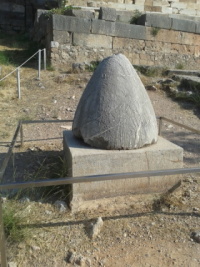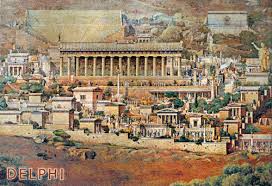Oracles

The Oracle at Dodona is well signposted off the Egnatia, about twenty kilometres west of Ioannina, but easy to miss close up: hidden in plain sight behind plain black railings with no signage, no billboards, only the two flags, one blue and gold, one blue and white, and a tiny brass plaque; like a dentist's. Entrance to the site of the greatest and most ancient Oracle was 1 euro. We'd set out very early, as a precaution against tourbuses, but I don't think it was necessary. We were completely alone for most of our visit, except for a single, very plump guard who never stirred from her shady seat; except to blow her whistle when we ventured too near the Do Not Cross tape around the proscenium.
The theatre was built to hold 17,000 people, which is quite a thought, considering how they'd have had to get here. It's functional again, there was a stunning production of Medea here a couple of years ago. Originally and for a long time there were no buildings. Ge, the earth mother was worshipped in the open. When Zeus (also known as Dion) moved in, Ge became known as his wife, Dione and they lived together in a sacred house, beside the old sacred enclosure. The Zeus of Dodona is known as Nias, the dweller; which I liked. It makes him sound homely, like the naiad of a stream. He dwells here in Ge's sanctuary. Later on, other shrines were built for other deities, and a council chamber for Epirote decision-making. Only the foundations remain.
The historical record of this place is obscure and confusied, but it seems that priests, male, and the "doves" female accepted written questions on strips of lead, and gave answers based on what they heard in the sound of the sacred oak's leaves, rustling in the breeze. Later on, metal cauldrons suspended on tripods were set around the oak's trunk for the breeze to shake, which probably made a more impressive noise. We listened, but we could barely hear a whisper. I don't know about Peter, but I couldn't frame a question, which was a slight problem. I'm just not in that mind set. There aren't any cauldrons, currently. In the fourth century CE, local Christians chopped down a huge ancient oak and dug out the roots, hoping for buried treasure. All they found was a big empty hole: I suppose that was some kind of answer. The tree in the courtyard of the Sacred House now was planted by one of the archaeologists on Constantin Carapanos's famous dig, about 1880. In Ioannina's archaeological museum (at the gates of a park opposite the Town Hall) you can see some of the lead strips. The questions are banal, direct, heartfelt. Should I marry? Did he steal from me? The answers, archaeologists reckon, must have been delivered orally: as there don't seem to be any replies.

In the butterfly-haunted isolation, austerity and silence of Dodoni we asked ourselves what did Delfi do right (or wrong)? Was this site too remote? Too near the border; the seers not crazy enough? We knew what to expect at the navel of the world, of course. You never hear of Dodoni: Delfi is a world-famous UNESCO celebrity. On this trip we arrived early not to escape the tourbuses (the Delfi experience in quiet loneliness would be a contradiction in terms), but to avoid the worst of the heat. It was stinky hot, the whole time we were in Sterea Ellada. You could have fried eggs on the pavement, when we were eating our supper at 11pm or so, down in Galaxidhi. Obviously, when you get here, what Dodoni did right was to be a long way from those pesky city states. There was nothing going on up in Epirus to inspire the jumble of insanely competitive erections, like a gargantuan toybox spilled by a giant child in a temper, that turned the eagle's eyrie site of the Sacred Precinct of Apollo into such an unholy mess. I couldn't stand the place (nb, I had not had my breakfast). The crowds, esp the Japanese in costume (various) and the nice friendly Greek man in the Burberry check suit with matching umbrella were by far the most interesting and engaging part of it, and I bet that's been true for a long, long time. Entrance to the precinct and the museum inclusive cost us 12 euros each; catering is private enterprise, aggressive and totally inadequate.

 You were required to wash your hair in the Castilian Spring before you consulted the Pythia. Byron jumped right in. You couldn't do that now, the pool is dry (says everything about Delfi). But you can fill a bottle, from a gutter where the water runs under the fence. It's cold and good. When Alexander tried his luck, wanting to know whether he would conquer the world, the priestess refused to say anything, until he dragged her off her hallucinogenic gas-vent by the hair, at which she shrieked You are unconquerable!, and Alexander said "I have my answer." Absolutely typical Delphic utterance: she got him good, haha, as he wasn't strictly conquered, he died of typhoid. The more you look into it, the more you wonder why anybody ever paid for this service. Why not just come to Delfi and hang out in the wine shop: pick up on the information exchange less twisted out of shape and on the cheap? I suppose, actually, that's what most people did.
You were required to wash your hair in the Castilian Spring before you consulted the Pythia. Byron jumped right in. You couldn't do that now, the pool is dry (says everything about Delfi). But you can fill a bottle, from a gutter where the water runs under the fence. It's cold and good. When Alexander tried his luck, wanting to know whether he would conquer the world, the priestess refused to say anything, until he dragged her off her hallucinogenic gas-vent by the hair, at which she shrieked You are unconquerable!, and Alexander said "I have my answer." Absolutely typical Delphic utterance: she got him good, haha, as he wasn't strictly conquered, he died of typhoid. The more you look into it, the more you wonder why anybody ever paid for this service. Why not just come to Delfi and hang out in the wine shop: pick up on the information exchange less twisted out of shape and on the cheap? I suppose, actually, that's what most people did. The Sibyl's Rock, where the Sibyl used to stand to chant her oracles, before Apollo moved in, is still there, an incongruous natural outcrop in the overturned toybox. In all the sacred places, at Dodoni, in the royal tombs of Macedon, in Dion, in Delfi, and in the Corycian Cave, high above Delfi in the Western Parnassos, we found this same message: Ge was here. Our original divinity was the earth. We read her as female, we called her mother, she gave us everything and we owed her everything. The sky-gods took over, long ago. Apollo rode into Delfi as a dolphin, and killed the sacred python. Zeus turned up one day at Dodoni, in the form of an eagle, and insisted on changing everything. Hades stole the Maiden... But she was here, and she's still here, not gone, only demoted, partially erased, co-opted; in everlasting mourning. (She's still here right now, known as the Panaghia, the All-Holy; the God-bearer, under the current regime and on much the same terms). It was a strange counterpoint, anyway, to our travels here, and to the trails I insisted on following; in these rapidly darkening times, for Greece and for the world. The sky-gods, the heroes and their brief adventures, playing against the rivers, the forests, the numinous hollow hills where spirits dwell.

The springs of Acheron was the best thing.

Comments
Display comments as Linear | Threaded